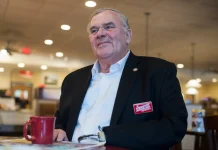Commentary: Sorry Seems To Be The Hardest Word
By John Krull
TheStatehouseFile.comÂ
INDIANAPOLIS – The controversy regarding comedian Kevin Hart and the Oscars shows that two simple sentences can make a big difference.
The first sentence is: “I was wrong.â€
The second is: “I’m sorry.â€
Hart was supposed to host the Academy Awards. Some old tweets and comedy bits of his, though, became the subject of both attention and criticism.
Critics said the tweets and bits were homophobic.
They were right.
Hart’s jokes were homophobic.
The Oscars’ producers gave Hart a choice – apologize for the jibes or lose the hosting gig.
Hart opted to bow out rather than say he was sorry. He said he didn’t feel the need to apologize because he said he’d dealt with the issue before. But, when the controversy continued to mount, he finally, grudgingly, apologized.
It would have been so much simpler – so much kinder – for Hart to say from the first that he was sorry, that he’d made a mistake and that he’d learned from it.
Our society now is at a turning point. Old attitudes have come under indictment.
This is good.
Much of what we said or believed in the past wasn’t right.
Cruelty isn’t funny. Neither is bigotry or hate.
Coming to understand that, though, often takes time.
Like many guys my age, I passed my adolescence in a state of happy homophobia. Making jokes about gay people was a pastime for my high-school buddies and me.
We didn’t think much of it.
We thought we were making fun of something resembling fictional characters, like those in a comic strip. It never occurred to us that people we went to school with, people that we played sports with, people we hung out with, might be gay.
But they were.
Some of those folks are friends of mine to this day.
There’s only one word to describe how I feel when I think of things they heard me say when we were in high school together.
Ashamed.
But that’s appropriate. I should feel that way. I did and said things of which I should be ashamed.
And shame can be a great teacher.
The reality is no one makes it through life without doing things he or she regrets. Unless we’re determined to cling to ignorance, most of us learn things along the way, including when we have done others wrong.
When we do discover we’ve done something wrong, the decent among us want to atone for it.
A genuine apology is among the most humane and spiritual acts we can perform. Done right, an apology helps heal not just the person to whom wrong has been done but also the person who did the wrong.
The apology, though, must be real. No real apology contains the word “if†or “but.â€
“If†suggests the person who has been harmed might be too sensitive and thus responsible in some way for the harm we have caused her or him. “But,†says there was some justification for hurting another person for no reason.
Both are abdications of personal and moral responsibility.
We human beings do horrible things to each other on a routine basis. Many cannot be undone because some wrongs just cannot be made right.
And we must live with that.
But acts of honest contrition can ease the pain, even if they do not heal the wound inflicted.
That’s what we are called to do now.
In this divided and often anguished world, in this divided and often anguished country, there’s a good way to start easing the anguish and bridging the divide.
That way begins with, “I was wrong.â€
And continues with, “I’m sorry.â€
FOOTNOTE: John Krull is director of Franklin College’s Pulliam School of Journalism, host of “No Limits†WFYI 90.1 Indianapolis and publisher of TheStatehouseFile.com, a news website powered by Franklin College journalism students.
The City-County Observer posted this article without bias or editing.






